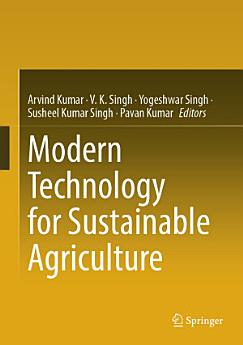Modern Technology for Sustainable Agriculture
About this ebook
About the author
Prof. Arvind Kumar, a renowned educationist and researcher having more than four decades of experience was given the responsibility from May 2014 to June 2022 by the President of India as first Vice Chancellor of Rani Lakshmi Bai Central Agricultural University, Jhansi. Prof. Kumar has an excellent academic record to his credit. He obtained M. Phil. (1971) and Ph. D. in Agronomy (1975) from Meerut University, Meerut. Prior to this assignment Prof. Kumar worked as DDG (Education), ICAR, New Delhi from 2009–2014, held the additional charge of DDG (Fisheries), ICAR, New Delhi about 5 months and was the Director of DRMR, Bharatpur from 2002 to 2009.
Dr. V. K. Singh is currently Director, Central Research Institute for Dryland Agriculture, Hyderabad, India. Dr. Singh has made valuable contributions in the area of soil fertility appraisal and soil health restoration through site-specific nutrient management (SSNM) and inclusion of legumes in intensive cropping systems. His effort on soil fertility appraisal using geo-statistical tools in different agro-ecologies revealed widespread multi-nutrient deficiencies. The extensive studies by him at cultivators’ fields underlined the significance of SSNM for addressal of multi-nutrient deficiencies, improving yields, and profits under different cropping systems.
Prof. Yogeshwar Singh, a researcher and educationist having eighteen years of experience has been given the responsibility as Founder Head (Agronomy) on April, 2020 at College of Agriculture, Rani Lakshmi Bai Central Agricultural University, Jhansi to develop the department as an excellence of teaching, research and extension. Prior to joining as Professor (Agronomy) at College of Agriculture, Rani Lakshmi Bai Central Agricultural University, Jhansi Dr Singh was serving as Principal Scientist, ICAR-National Institute of Abiotic Stress Management, Baramati, Pune, Maharashtra.
Dr. Susheel Kumar Singh is currently serving as an Assistant Professor in the Department of Soil Science at the College of Agriculture, Rani Lakshmi Bai Central Agricultural University, Jhansi, (UP) India. He completed his Ph.D. in Soil Science and Agriculture Chemistry from the department of Soil Sciences and Agriculture Chemistry at Sardar Vallabhbhai Patel University of Agriculture and Technology, Meerut UP).
Dr. Pavan Kumar is presently Assistant Professor at College of Horticulture and Forestry, Rani Lakshmi Bai Central Agricultural University, Jhansi, U.P., India. He obtained his Ph.D degrees from Faculty of Natural Sciences, Jamia Millia Islamia, New Delhi. He did B.Sc. (Botany) and M.Sc. (Environmental Science) from Banaras Hindu University, Varanasi, India and subsequently obtained Master’s degree in Remote Sensing (M.Tech) from Birla Institute of Technology, Mesra Ranchi, India.




